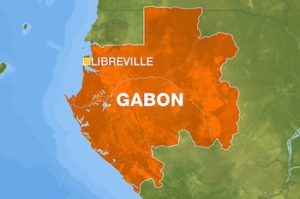
*On this date in 1960, Gabon gained its independence from France. Officially the Gabonese Republic they are a country on the west coast of Central Africa.
Originally settled by Pygmy peoples, they were absorbed into the Bantu tribes as they migrated. By the 18th century, a Myeni-speaking kingdom known as the Kingdom of Orungu formed in Gabon. It became a powerful trading center mainly because it purchased and sold enslaved people. The kingdom fell with the demise of the slave trade in the 1870s and the ensuing results of the Berlin Conference.
Since its independence from France in 1960, the sovereign state of Gabon has had three presidents. In the early 1990s, Gabon introduced a multi-party system and a new democratic constitution that allowed a more transparent electoral process and reformed many governmental institutions. Located on the equator, Gabon is next to Equatorial Guinea to the northwest, Cameroon to the north, the Republic of the Congo to the east and south, and the Gulf of Guinea to the west. Its area is nearly 100,000 sq mi, and its population is 2.1 million. There are three distinct regions: the coastal plains, the mountains (the Cristal Mountains and the Chaillu Massif in the center), and the savanna in the east.
Gabon’s capital and largest city are Libreville. The official language is French. Gabon is rich in folklore and mythology. “Raconteurs” keep traditions alive among the Fangs and the Ingwala among the Nzebis. Gabon is also known for its masks and the reliquary figures of the Kota. Musically, Gabon boasts an array of folk styles and singers who perform in non-traditional styles, like Patience Dabany and Annie-Flore Batchiellilys. Also known are guitarists like Georges Oyendze, La Rose Mbadou and Sylvain Avara, and Oliver N’Goma. Gabonese folk instruments include the Obala, the Ngombi, the balafon, and traditional drums.
Since independence, Gabon has followed a nonaligned policy, advocating dialogue in international affairs and recognizing each side of divided countries. In inter-African affairs, Gabon espouses development by evolution rather than revolution and favors regulated private enterprise as the system most likely to promote rapid economic growth. Gabon played an important leadership role in the stability of Central Africa through involvement in mediation efforts. These were in Chad, the Central African Republic, Angola, the Republic of the Congo, the Democratic Republic of the Congo, and Burundi.
In December 1999, through the mediation efforts of President Bongo, a peace accord was signed in the Republic of the Congo (Brazzaville) between the government and most leaders of an armed rebellion. President Bongo was also involved in the continuing DRC peace process and played a role in mediating the crisis in Ivory Coast. Gabonese armed forces were also integral to the Central African Economic and Monetary Community (CEMAC) mission to the Central African Republic.
Petroleum and foreign private investment have helped make Gabon one of the most prosperous countries in Sub-Saharan Africa, with the fifth-highest HDI in the region (after Mauritius, Seychelles, Botswana, and South Africa) and the fifth-highest GDP per capita (PPP) in all of Africa (after Seychelles, Mauritius, Equatorial Guinea, and Botswana). Its GDP grew by more than 6% annually from 2010 to 2012. However, because of inequality in income distribution, a significant proportion of the population remains poor.